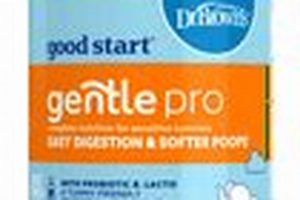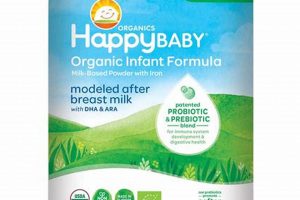
The act of promoting and marketing infant nutritional products within the Australian market is subject to stringent regulations. These regulations govern how companies can showcase their offerings to potential consumers, ensuring accuracy... Read more »

Specialized infant nutrition products are designed to address digestive discomfort in babies. These formulations often contain modified proteins, reduced lactose levels, or added prebiotics and probiotics to ease digestion and reduce symptoms... Read more »

Products marketed for their suitability for infants with sensitive digestive systems represent a significant category within the broader baby formula market. These formulations are often designed to minimize discomfort and promote healthy... Read more »

Receptacles specifically designed for storing and dispensing powdered infant nutrition are essential components of modern infant feeding practices. These vessels, often composed of plastic or metal, serve to maintain the sterility and... Read more »

Water sourced directly from a natural underground aquifer and bottled at the source is often considered for the preparation of infant formula. This particular type of water is characterized by its mineral... Read more »

Infant nutritional products designed to mimic the composition of human milk aim to provide the most comprehensive nutritional support for infants when breastfeeding is not possible or is insufficient. These formulations strive... Read more »

The phrase refers to instances where legal claims concerning infant formula and necrotizing enterocolitis (NEC), a severe intestinal disease affecting premature infants, have progressed to the point of having plaintiffs formally agreeing... Read more »

A specialized nutritional substitute serves as a crucial resource for orphaned or abandoned young lagomorphs, replicating the composition of a doe’s milk. This tailored solution typically contains essential proteins, fats, and carbohydrates,... Read more »

This involves a situation where a manufacturer of infant nutrition products voluntarily or involuntarily removes its products from the market due to safety concerns. These concerns often stem from potential contamination issues,... Read more »

The inquiry into whether infants fed with manufactured milk alternatives experience improved sleep patterns compared to breastfed infants is a common concern among new parents. Factors influencing infant sleep are complex and... Read more »


